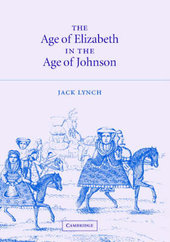
|
The Age of Elizabeth in the Age of Johnson
Hardback
Main Details
| Title |
The Age of Elizabeth in the Age of Johnson
|
| Authors and Contributors |
By (author) Jack Lynch
|
| Physical Properties |
| Format:Hardback | | Pages:240 | | Dimensions(mm): Height 229,Width 152 |
|
| Category/Genre | Literary theory
British and Irish History
World history - c 1500 to c 1750 |
|---|
| ISBN/Barcode |
9780521819077
|
| Classifications | Dewey:942.055 |
|---|
| Audience | | Professional & Vocational | |
|---|
|
Publishing Details |
| Publisher |
Cambridge University Press
|
| Imprint |
Cambridge University Press
|
| Publication Date |
12 December 2002 |
| Publication Country |
United Kingdom
|
Description
In The Age of Elizabeth in the Age of Johnson, Jack Lynch explores eighteenth-century British conceptions of the Renaissance, and the historical, intellectual, and cultural uses to which the past was put during the period. Scholars, editors, historians, religious thinkers, linguists, and literary critics of the period all defined themselves in relation to 'the last age' or 'the age of Elizabeth'. Seventeenth- and eighteenth-century thinkers reworked older historical schemes to suit their own needs, turning to the ages of Petrarch and Poliziano, Erasmus and Scaliger, Shakespeare, Spenser, and Queen Elizabeth to define their culture in contrast to the preceding age. They derived a powerful sense of modernity from the comparison, which proved essential to the constitution of a national character. This interdisciplinary study will be of interest to cultural as well as literary historians of the eighteenth century.
Author Biography
Jack Lynch is assistant professor of English at Rutgers University. He is co-editor, with Paul J. Korshin, of The Age of Johnson: A Scholarly Annual. He is the author of A Bibliography of Johnsonian Studies, 1986-1998 (2000) and Samuel Johnson's Dictionary: Selections from the 1755 Work that Defined the English Language (2002).
Reviews'An original and major contribution to the reader's understanding of eighteenth-century cultural identity.' The New Rambler
|